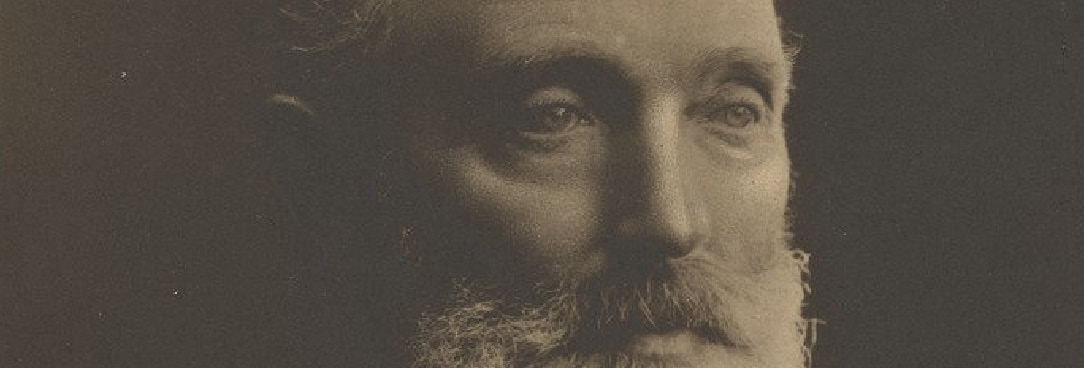Last updated:
‘The state of feeling in the district: An attempt to resist central control after the 1872 Education Act’, Provenance: The Journal of Public Record Office Victoria, issue no. 11, 2012. ISSN 1832-2522. Copyright © Carolyn Woolman.
This is a peer reviewed article.
The 1872 Education Act was designed to make major changes to the way public education was organised and administered in Victoria. Its central concept was the provision of free, compulsory, secular education. To conduct the system a highly centralised bureaucracy was proposed: the government through the Education Department would control staffing, salaries, buildings, the curricula and examinations. Doubts were voiced by politicians and others about the large‑scale shifting of control from the local school committees, but the Act was eventually passed.
In July 1876 the local district inspector ran a two‑day inquiry at Baringhup State School after the head teacher suspended the pupil teacher who had made charges against him to the school’s Board of Advice. This article will examine how power was exercised in this specific situation and the factors affecting the outcome of the inquiry. The crucial issue was who was to control the local school.
The passing of the ‘free, compulsory and secular’ Education Act in Victoria in 1872 has been regarded by later generations as a victory for democracy. The notion that every child had the right to a basic education was generally accepted by colonists at the time, but it took several years before the Act was passed. Catholic and Protestant clergy and adherents were disappointed by the ‘secular’ provision, as were influential liberal politicians such as George Higinbotham, chairman of the 1866 royal commission into the common schools system, the process of which had resulted in the (collapsed) 1867 Bill. Higinbotham regarded the secular provision not as an ideological expression but as a compromise. He would have preferred that part of the school day under the new administration included a syllabus of non‑sectarian ‘common Christianity’, imparted by laymen, but viewed a secular system as a lesser evil than the existing system of state aid to clerically controlled schools.[1]
A highly centralised system of administration was proposed to conduct the reformed education system to be set up by the 1872 Act. A major reason was that this was believed to be the best means of removing the schools from local sectarian pressures. However, some politicians were uneasy about centralisation and endorsed it with reluctance. There was a leaning among both liberals and conservatives to value the restraints which local government placed on the state. There was also a belief in the desirability of ratepayers participating in local education as a communal responsibility and a fear that this commitment would be stifled by the centralisation of school administration in the hands of a government department.[2] The powers proposed for the Minister of Public Instruction, such as control over teacher appointments, secular instruction and the use of school buildings, were directly at the expense of the school committees, which would now be boards of advice appointed by the minister.[3] These boards were to see that the Act’s compulsory attendance clause was carried out and advise on the needs of schools throughout the district.
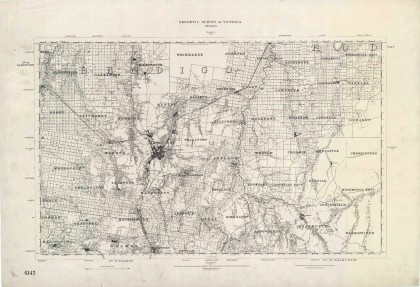
Some historians have emphasised the growth of centralised control and consequent withering of local school government. For instance, Stuart McIntyre argues that the passage of the 1872 Act ended any chance of effective local control of (or even influence on) Victorian state schools, with the local boards becoming ‘lifeless vestiges’ of the earlier local committees.[4] Denis Grundy states that the Act ‘accomplished the ruin of local school government, overwhelmed the conservative tradition by stressing the need for public efficiency and revealed the increasing reluctance of the liberal state to leave matters to the untidy and uncertain operation of local interests’.[5] He concedes that the boards of advice did not go quietly and the first ten years after the Act involved a power struggle between the Education Department and the boards. In contrast to Grundy, Ann Larson points out that although the only formal avenues provided for community input were the local boards of advice ‘whose title reflected their lack of authority’, micro-histories have demonstrated that parents, teachers and local boards at times achieved continuity and control through a variety of strategies.[6] For example, Marjorie Theobald uses the Education Department’s special case files to analyse the complexity of relationships between individuals, local boards and the department.[7]
This article will examine how power was exercised to resolve a conflict involving staff at Baringhup State School No. 1687. The agricultural settlement of Baringhup, located on the Loddon River and originally part of the Bryants’ Cairn Curran pastoral run, was established under Governor La Trobe’s reserve powers in the early 1850s to provide food for the miners on the Central Victorian goldfield of Tarrangower. The township which developed on this goldfield was situated about seven miles from the district of Baringhup, and in 1856 was surveyed and named Maldon. By the 1870s, the riding of Baringhup’s main products were grains, flour, dairy and wool. Bailliere’s gazetteer describes ‘an industrious and well‑to‑do class of yeomen and farmers, possessing holdings up to 1000 acres. The largest holders combine wool with grain growing in the Baringhup district. The farms on the whole are well laid out with comfortable homesteads’.[8]
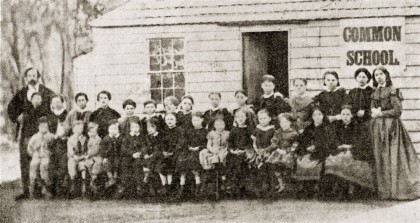
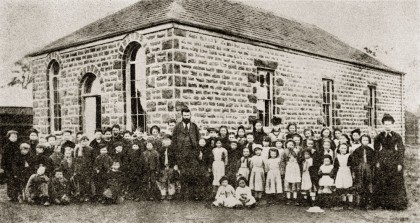
The first school had been opened in Baringhup in 1855 when parents and guardians of eighty children paid quarterly fees. In 1859 a more substantial building was erected, then from 1874 the Baringhup Free Library Hall was used as a schoolhouse. In July 1874 Henry Walter Mills was appointed head teacher.[9] Baringhup State School No. 1687 was opened in January 1876 in a large bluestone building with an attached bluestone residence of four rooms, with Mills again appointed as head teacher.[10] At the Common School, his wife Mary Anna Burn Mills had been work mistress and Mary Jane Griggs had been pupil teacher (from September 1875). They were also re‑appointed.[11] According to the school’s entry in Vision and realisation, ninety‑five children were enrolled in 1876, aged between three and fourteen and a half. The 1876 enrolment records show eighty‑four enrolments.[12] This range of ages was not uncommon in the period. Previous inspectors’ reports on Mills’s performance were favourable. His most recent was from Inspector Thomas Bolam (Dunolly District) in August 1875 at Baringhup Common School: ‘An intelligent and thoroughly industrious teacher whose heart is evidently in his work’.[13]
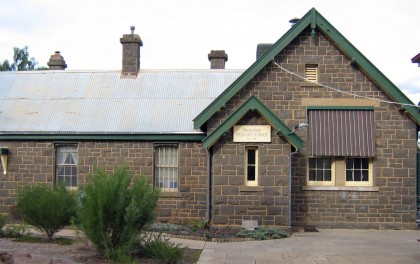
In July 1876 a two‑day inquiry was held at the school by Inspector Bolam. Mary Griggs had been suspended by the head teacher Henry Mills for ‘insubordination and maliciously injuring his reputation’, after she complained to the Board of Advice that the head teacher neglected his duties, shifted his responsibilities onto herself and punished pupils for consequent poor achievement. There was sufficient evidence uncovered by the inquiry to satisfy Inspector Bolam and later Henry Venables, the Secretary of the Education Department, that Mills had in fact neglected his duties. Venables recommended that Mills should be removed to a smaller school or demoted to an assistantship.
A considerable amount of information on this inquiry is held as a Special Case File at PROV. According to the description in PROV’s online catalogue, special case files were ‘created by the collation of relevant information from various parts of the Education Department’s correspondence systems’. These files ‘were determined to be special because of their excessive size, their delicate or important subject matter or due to the seniority of staff using the files eg: ministers, directors and their assistants’.[14]
Such a collation can prove very useful to a researcher. In this case, it furnishes the district inspector’s full report; letters from the head teacher, the suspended pupil teacher Miss Griggs, her father Samuel Griggs, and a Board of Advice member David Marshall; ‘comments’ from James Service MLA; recommendations from Henry Venables, the department secretary; a petition to the Minister of Public Instruction, Robert Ramsay, signed by parents of current pupils and others; and a memo from Ramsay. The local Maldon and district newspaper, the Tarrangower times, published nothing at all about this case, and not necessarily because of its sensitive nature. (The paper was not reticent about publishing astonishing personal and family details in 1870 when a Maldon schoolteacher was sued by his wife for maintenance.)[15] Obviously a newspaper editor could decide to omit or alter material to protect the reputation of someone perceived as a valued community member. On the other hand, the material in the PROV file has not been interpreted, adorned or sanitised. It is therefore a valuable resource when seeking to cast light on the tension between local communities and a centralised bureaucracy brought about by the 1872 Education Act.
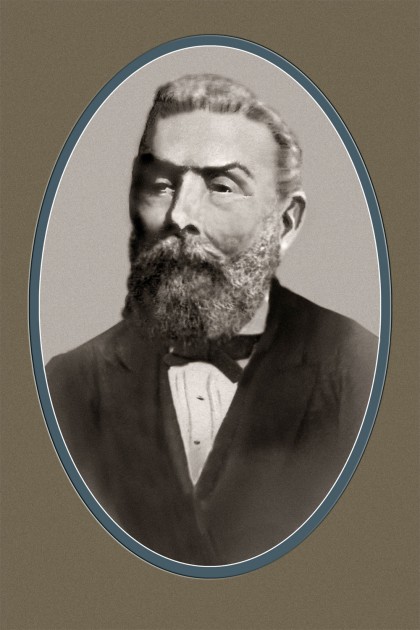
In Bolam’s report on the inquiry (dated 11 July 1876) he outlined the two sets of charges and attached detailed evidence relevant to each charge.[16] The head teacher’s charges against the pupil teacher were: insolence on the afternoon of June 26; insolence on June 27; scandal reported by the pupil teacher’s father; and forwarding to the Board of Advice a false and malicious report affecting the head teacher’s character.
The pupil teacher’s charges against the head teacher were: frequently neglecting his duty by leaving school during school hours; causing extra work to be done by the pupil teacher who was unable to attend to it; and punishment of children in the pupil teacher’s classes for want of improvement when under the circumstances they could not receive proper attention.
Much of Bolam’s evidence was obtained by questioning the pupils themselves and some by questioning parents and other adults. Staff attendance sheets were also included as evidence. Unsurprisingly, witnesses swore to conflicting versions of Mills’s frequency and duration of absences and his treatment of pupils with poor results. A crucial point is that some of the children the head teacher called as his own witnesses admitted, sometimes inadvertently, his frequent absences from the classroom. For example, William Lawrence stated that Mr Mills ‘was not usually absent for more than thirty minutes at a time’.
Bolam’s findings were succinctly expressed. He concluded that Mr Mills’s role as honorary secretary of the local agricultural society had interfered with his school duties. He had also incurred too many other unwarranted absences. He had loaded too much work onto the pupil teacher who was young and inexperienced and ‘of a highly sensitive and nervous temperament’. He had reprimanded the teacher and punished children in her classes (the punishment included caning) for ‘want of improvement’ when they had not received sufficient attention. Further, he ‘had suspended the pupil teacher without consent of the department’. The latter criticism is directly relevant to the centralisation issue under discussion.
Bolam conceded that ‘until this current year Mr Mills appears to have worked well in the school, with good reports and results’. He considered Miss Griggs ‘intelligent, diligent and promising’. However, he urged that it was ‘most undesirable’ that the head teacher and pupil teacher should continue to work in the same school.
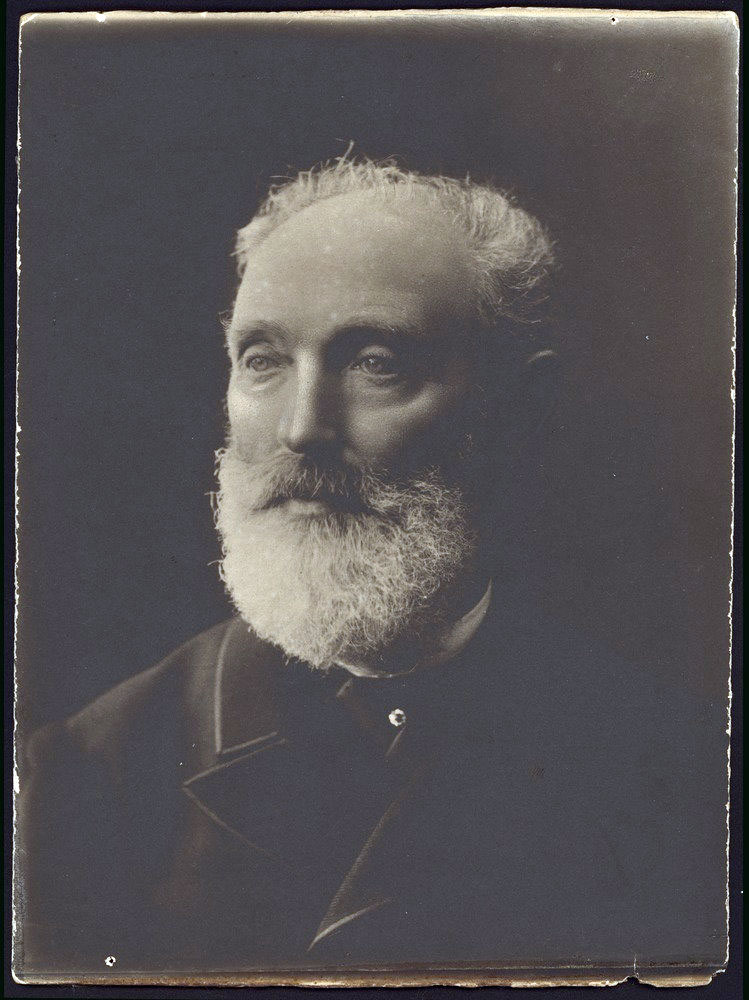
[ca.1920-ca. 1950]. Courtesy State Library of Victoria.
After the hearing, Bolam told Board of Advice member David Marshall that the pupil teacher’s charges against the head teacher had been proven and that his against her had not. Marshall was not acquiescent. He sent a telegram dated 12 July to Maldon MLA James Service requesting him ‘to ask Secretary Education Dept to stay action re Baringhup case till letters arrive midday’. Marshall was a successful Baringhup farmer and prominent in local affairs in both Baringhup and Maldon. (He had been present for the two-day hearing, while the Board chairman Thomas Lillie had stayed for one day, then left in disgust.) Marshall’s subsequent letter to the secretary argued that the inspector was not impartial in conducting the hearing.[17] Service added the following note before forwarding Marshall’s letter to Robert Ramsay, probably to ensure that attention would be paid to a letter which, though coherently argued, might be judged by the latter to be deficient in penmanship and presentation.
I beg to forward this communication for the consideration of the Hon. the Minister of Public Instruction. Mr Marshall unfortunately had not the benefit of a govt education in his youth, but he is a worthy straightforward man, and possesses a strong sense of justice. He is also a member of the Shire Council.
I have [under]lined the statements that seem to require special enquiry. J Service/ 14/7/76
Part of Marshall’s letter reads:
I found the enquiry was conducted so unfearly by the Inspector that after sitting a short time I drew his attention to the great Partiality he was showing on behalf of the pupil Teacher – whose Brother is in his Employ –I obtained from him no redress but was informed that if I spoke again I would have to leave the room. The Inspector had an evident bias against Mr Mills and when that gentleman brought forward witnesses to disprove the charges Made against him Mr Bolam either declined to take their evidence or if he did take it he informed them that it would do Mr Mills no good as he would not consider their evidence when sending in his report I therefore trust you will take no further action in the matter until a further enquiry has taken place before an impartial Judge as none of the witnesses were examined on Oath & the statement made by some of them were very ridiculous & could easily I think have been disproved had Mr Mills been allowed the opportunity.
The underlining was Service’s.
Secretary Venables’ memo to his clerk dealt with Marshall’s letter and also Bolam’s report on the case.[18] Regarding Marshall’s claim that Miss Griggs’s brother was employed by Bolam, he wrote ‘This is as stated’. He required that Marshall should be requested to explain how the ‘great partiality’ was demonstrated and to state ‘whose evidence did Mr Bolam decline to receive, and what points were those witnesses prepared to disprove’.
In response to Bolam’s report he wrote:
Mr Bolam has forwarded the evidence given, in each case signed by the witness.
I have carefully considered this evidence in connection with Mr Bolam’s report, and judging from it I agree with Mr Bolam in his finding that the teacher has neglected his duties and thrown work upon the pupil teacher which should have been performed by himself. I also consider the suspension of the pupil teacher to have been unwarrantable.
My opinion is subject to revision on any further evidence Mr Marshall may indicate as suppressed.
In regard to Mr Mills’ charges against Miss Griggs of insubordination and insolence, Mr Bolam considers the Teacher has failed to prove insolence. My opinion is that she was pert and disrespectful. Mr Bolam appears to base his finding upon the pupil teacher’s conduct being justified by the cause given by Mr Mills. I agree with him that Mr Mills had laid himself open to such expressions of want of respect as Miss Griggs was guilty of; but this does not justify her – she should have appealed not rebelled.
I have no doubt some allusion was made to the pupil teacher’s brother being employed by Mr Bolam, but so far do not see anything in the evidence which would seem to show that this has caused any irregularity in the manner in which Mr Bolam has dealt with this case.
I think that, unless Mr Marshall’s reply should raise any point calling for further enquiry, Mr Mills should be removed to a smaller school, or to an assistantship as the Inspector General may think most desirable, and that Miss Griggs should be cautioned. H.V. 22/7/76
Marshall’s long letter in reply furnished many examples of what he perceived as Bolam’s partiality, which included the following. During the inquiry the inspector invariably addressed the pupil teacher as ‘my dear’ and when speaking of her called her ‘this child’ or ‘this poor delicate girl’, while his manner to Mr Mills was ‘quite the opposite’. He asked the pupil teacher if she had called the head teacher ‘a dog’, ‘a beast’ and ‘worse than a beast’ and the girl admitted this; he put this down in writing and afterwards tore it up, saying he would not forward it.[19] Mr Bolam refused to receive two letters that Marshall presented from two pupils attending the school because one of these was out of the district, while he received hearsay evidence ‘of the most trivial description’ from witnesses called by the pupil teacher. He told various (named) witnesses who spoke in favour of Mr Mills that their evidence was worthless and he would not submit it. Mr Lillie, the chairman of the Board of Advice, was ordered to ‘leave the room’ on two occasions and Mr Lillie ‘felt so the manner in which Mr Bolam was treating Mr Mills’ that in consequence he, Lillie, declined to attend on the second day of the inquiry. Also, Mr Bolam had told Marshall that ‘the girl’ came to stay at his own house on the day she was suspended.
Mills had been asked by the secretary whether he too accused Bolam of partiality in conducting the inquiry. Mills replied on 22 July in a seventeen-page letter.[20] He included an account of Bolam’s conversation with Mrs Caroline Lawrence when he first arrived in Baringhup for the hearing, to indicate that the inspector had already made up his mind on its outcome. Caroline Lawrence was the owner of the Loddon Hotel and farmland and four of her children were attending the school in 1876. The reported conversation included the following:
Mr Bolam volunteered to Mrs Lawrence the statement that I would lose my appointment or be dismissed, and insinuated further that I was like a horse that had just come off poor feed to be fed on oats. A gratuitous insult on Mr Bolam’s part as I occupied a far better position before I became a teacher than I have ever done since.
There was a note in the margin next to the above from Bolam: ‘Incorrect’.
Mills then gave an outline of his past career, ‘digressing so far to show that Mr Bolam’s insulting insinuation was quite uncalled for’, and this outline gives some insight into why he had considerable local support.
Before I was 20 years of age, I served through the New Zealand war, was present at 4 general engagements and received the war medal for my services. On returning to Victoria I went into business as a Store Keeper and traded to the extent of £1000 per month. During that time I served 6 years as a Councillor of the Shire of Metcalfe [which included Chewton and Harcourt], held the office of President for a term, and was appointed to the commission of Justice of the Peace. On relinquishing store keeping I unfortunately turned my attention to mining speculation where I lost a good deal of money, when I entered the profession of teacher and passed the necessary examinations.
He expressed bitterness at Bolam’s generally ‘demeaning and insulting’ manner to him during the inquiry and detailed several examples of perceived partiality to Miss Griggs. He disputed the evidence of several of Miss Griggs’s witnesses that he frequently absented himself from the classroom and unduly punished pupils. He thought neither that his absences were excessive nor that he was exploiting his pupil teacher.
I quite admit that the two days prior to the Agricultural Show I was absent from the school a great deal, that I have been absent for not more than 10 minutes on a few occasions since, chiefly for necessary purposes or after my illness by the doctor’s orders for the purpose of having a glass of wine, that I gave the classes not supervised by the pupil teacher ample work to last them until I returned, and I invariably told the pupil teacher if any talking went on etc she was to at once report the matter to me on my return. I always asked her if the children had behaved themselves and she always told me they had.
Later in his letter he expanded on his two‑day absence at the Agricultural Show, offering a controversial reason:
His Excellency the Governor had promised to visit Baringhup on the day of the Show and I was requested to assist with the big boys attending the school in preparing for his Excellency’s reception building triumphal arch etc. As a Government officer and loyal subject of her Majesty I did not think I could well refuse, so took the big boys and worked with a will for that object.
To a present-day reader of this letter, Mills reveals a lack of awareness of the unenviable position of Mary, who at fifteen was responsible for his classes as well as her own during his absences. Her parents Samuel and Julia Griggs lived in the Baringhup district, her father being listed as a labourer in the school enrolment records and in a Tarrangower times report of a court case in which he was a witness.[21] The nature of her elder brother John’s employment with Inspector Bolam is not known. Her sister Annie, aged eleven, and brother Samuel, aged eight, were pupils at the Baringhup school. Mary may have always told the head teacher that the pupils ‘had behaved themselves’ as he claimed, but she was in a vulnerable position – she was dependent on him for her training. Also, Mills expresses resentment that Inspector Bolam had stressed her youth, because she was ‘not a child’ but ‘nearly 16 years old and tall and stout for her age’. This attitude seems harsh. However, Mary’s ‘shortcomings’ as a pupil teacher affected the results of students on which his own pay depended. In his own view he had done nothing wrong, but nevertheless as a result of her accusations had faced a humiliating inquiry in front of his own pupils which threatened his employment. The issue of cultural context is also relevant here. The level of maturity expected from a fifteen-year-old in 1876 was greater than that expected now.
Meanwhile, a petition addressed to the Minister of Public Instruction, Robert Ramsay, was circulated in Baringhup. Local MLA James Service wrote a covering letter:
Sir
I have the honour to hand you herewith a petition from a large number of Parents having children attending state school 1687, requesting that you will cause a further enquiry into the truth of certain charges preferred against Mr Mills head teacher. This petition is following up the action of Mr David Marshall whose letter I sent you the other day
I have learned from Mr Venables’ letter of 19th inst. the action you have already taken in this matter, but I think it only proper to put you in possession of the petition so that you may be aware of the state of feeling in the district
Yours truly
James Service
The petition was headed:
We the undersigned Parents of children attending State School 1687 and other residents of Baringhup beg most respectfully to request that you will cause a further inquiry into the truth of certain charges preferred against Mr Mills head teacher of the above school and lately investigated by Mr Inspector Bolam as we are of opinion that that investigation was not conducted in an impartial manner[22]
Then followed forty signatures – plus occupation, address, and number of children attending school where relevant. The name of Matthew Bryant, the local pastoralist, headed the list.
Of the forty signatures on this petition to the Education Department asking for an unbiased hearing, eighteen belonged to people who did not have children at the school in 1876, although there was no attempt to conceal this fact. According to the school records, in 1876 there were thirty‑two parents of eighty‑four pupils. (Only one parent of each pupil was recorded.) Only eighteen of these thirty‑two signed the petition. The remainder of the petitioners (four) was made up of people who claimed to be parents of relevant pupils, but who were not included on the enrolment records. Despite Service’s reference to the large number of current parents, the petition is not strongly representative of these. However, Service’s warning to Minister Robert Ramsay regarding ‘the state of feeling in the district’ may have carried more weight.
This petition and the efforts of Mills, Marshall and Service did not alter the conviction of the relevant public servants that Mills was guilty of neglect. The opinion of Venables was reviewed and the same conclusion was reached:
This is borne out not only by the witnesses produced by the pupil teacher, but also by those called by himself. Against this cloud of testimony as to Mr Mills’ frequent absences no statements of other persons that they had not seen him leave the school could have been of weight, and in pointing out to Mr Mills the uselessness of adducing such evidence Mr Bolam cannot be said to have shown a want of impartiality. Whether Mr Bolam did or did not show a leaning towards the pupil teacher – though matter for regret if it occurred -does not affect the question of Mr Mills’ negligence, which is all that is … to be proved against him. On this matter the evidence signed by the respective witnesses furnishes sufficient material for forming an independent judgment without reference to the opinion of Mr Bolam. 25.7.76 [The signature is indecipherable.][23]
These case files reveal much about both processes and cultural attitudes of the era. Mills referred in his letter to Secretary Venables to his public humiliation in front of his own pupils.[24] No misgiving seems to have been generally expressed about children being interrogated on the alleged misdoings of their teacher, in the presence of that teacher, with potential repercussions for those children. More relevant to the theme of this article is the following question. Why did Henry Mills, despite some damaging evidence against him, apparently retain support from the Board of Advice and many members of the Baringhup community?
David Marshall and Thomas Lillie, the Board of Advice members present at the hearing, concentrated on what they viewed as the inspector’s bias towards Miss Griggs, and were possibly justified in their concern. But the separate question of Mills’s frequent absences and consequent shifting of responsibilities onto his pupil teacher was apparently of less importance to the Board and those parents who supported him.
It is probable that other factors operated. Of the signatures on the petition to the Minister, four were those of women and thirty‑sex those of men. (Of the four women, two signed as ‘widows’ with no occupation listed, the third listed ‘postmistress’ and the fourth ‘farmer’.) Wives did not usually sign petitions in this male‑dominated society, and so without more evidence a gender issue cannot be argued. Class might have been a factor. Mills was honorary secretary of the flourishing Baringhup Agricultural Society and thirty‑one of the forty signatures were those of farmers. Only one man signed as ‘farm labourer’, suggesting that other farm labourers could not sign because they were illiterate, or were not asked, or chose not to sign. The most likely reason for Mills retaining support was his usefulness to Baringhup. He had outlined his previous occupations as soldier and storekeeper and his previous civic involvement in his letter to the Education Secretary. In addition, he was a sergeant in the Maldon contingent of the Castlemaine Volunteer Corps and frequently participated in rifle competitions, including at the Victorian level. He was honorary secretary of the Baringhup Free Library, performed in concerts to aid local charities, and was the electoral registrar.[25] All of the above would have worked in his favour with the Baringhup farmers. If they were over‑lenient in their estimation of Mills’s conduct as a teacher, or not concerned with it, this would be hardly surprising. David Marshall as president of the Agricultural Society had an additional reason for supporting Mills, in that it was given in evidence at the inquiry that the teacher had engaged in Society business during class hours.
Moreover, there was the immeasurable but potentially powerful resentment against the Education Department’s ‘interference’ in local affairs. Marshall and Lillie were not only angered by the inquiry being conducted in a ‘most partial manner’, but as members of the Board of Advice felt denigrated by Bolam’s behaviour towards them. Receiving public castigations from the district inspector is likely to have sharpened their awareness of the local committee’s weakness.
As noted previously, the Tarrangower times made no mention of the inquiry in 1876. It reported that Mills had submitted his resignation as secretary of the Agricultural Society on 19 July (Bolam’s report was dated 11 July) but included no reason for this, which was not its usual practice. The silence of the local newspaper can be viewed as additional assistance to Mills.
Outcome of the Inquiry
The outcome was that Mills stayed in the same position, in the same school, until 1879.
Mr Mills may be allowed to remain but he must in future be careful not to allow his duties in connection with local matters to interfere with his attendance at his School.[26]
And despite the alleged efforts of Mills to prevent this, Miss Griggs was re-instated. However, Mary did not resume duty after her suspension by Mills on 29 June until 25 October. There are several letters in the Special Case File related to this delay, but the essence is that Mills tried to prevent her re-instatement by informing the department that she had left the district. Mills was asked for an explanation for this but Venables did not believe him.
Inform him that his explanation is considered very unsatisfactory. He completely misled the Department by his letter of 8 July in which he stated that Miss Griggs had left the district. She must be allowed to resume duty at once and claim for the period of her absence.[27]
Minister Ramsay authorised back pay for Miss Griggs but ordered that she was to be informed that ‘any disrespect shown to the H.T. will lead to her removal’.[28] Her report from Bolam in August 1875 reads, ‘Quiet, needs more animation, but is intelligent and gives promise of future usefulness’. Reporting Mills to the Board of Advice in 1876 would have taken courage, as would returning to the school in October. In reporting her supervisor the pupil teacher was presumably assured in advance of the support of Inspector Bolam. (Mary resigned her position in March 1877. The reason is unknown.)[29]
In September 1876, Mills applied for a transfer ‘to some other school’ on the grounds that Miss Griggs’s proposed return would place him ‘in a most humiliating position’ because his authority with the pupils would be undermined and the discipline of the school would suffer.[30] Venables’ response was uncompromising:
His application for transfer will be considered should a fitting opportunity occur, but he has only himself to blame for the position in which he is at present placed.[31]
Mills was transferred to Brighton State School in late 1879. In 1884 he was appointed head teacher of Brighton East State School.[32] In 1878 Thomas Bolam was appointed Assistant Inspector‑General of Schools and for several months was Acting Secretary of the Education Department.[33]
After 1872, the system used by the department to ensure control over its schools included the inspectorate, payment by results and recruitment of pupil teachers to be trained by experienced teachers. This case study reveals a breakdown in the supervisor‑pupil teacher relationship, and the inspector’s finding, although accepted by the department secretary, was not acted upon. It was not unusual for conflict to occur between teachers and district inspectors whose reports affected the teacher’s livelihood, and in this case the conflict might have been personal as well as professional. It is likely that Mills’s considerable standing in the local community saved him. Possibly a political decision was made at the ministerial level as a result of intervention by James Service. Service, who represented Maldon in the Legislative Assembly from 1874 to 1881, was already a prominent colonial politician. He had been Victorian Treasurer from 1874 to 1875 (and would later become Premier in 1880, then Premier/Treasurer from 1883 to 1886). Political pressure through the agency of local members was common.
Moreover, the proposed transfer of Mills at this early stage in the development of the Education Department’s responsibilities clearly presented a practical problem, because even if there were a suitable vacancy, another school would be receiving a teacher already found negligent. Ultimately the decision whether to proceed against Mills may have rested on this question of timing, for in this transitional phase it would also have been impolitic to alienate the Baringhup community.
Whatever the nature of the final pressure, or the practical considerations, the judgement of the department was overridden. The 1872 Education Act had handed administrative power over Victorian schools to a government department, but the progress of the Baringhup inquiry and its outcome give an insight into the power, albeit somewhat unedifying, which could still be exercised at the local level.
Endnotes
[1] D Grundy, ‘Secular, compulsory and free’: the Education Act of 1872, Melbourne University Press, Carlton, Victoria, 1972, pp. 9-12.
[2] ibid., p. 78 and S McIntyre, A colonial liberalism: the lost world of three Victorian visionaries, Oxford University Press, Melbourne, 1991, p. 140.
[3] Grundy, p. 71.
[4] McIntyre, pp. 83, 153.
[5] Grundy, p. 5.
[6] A Larson, Growing up in Melbourne: family life in the late nineteenth century, Demography Program, Australian National University, Canberra, 1994, p. 66.
[7] MR Theobald, ‘Women’s teaching labour, the family and the state in nineteenth century Victoria’, in MR Theobald and RJW Selleck (eds), Family, school and state in Australian history, Allen & Unwin, Sydney, 1990.
[8] Bailliere’s Victorian gazetteer and road guide, 3rd edn, FF Bailliere, Melbourne, 1879.
[9] HW Mills had previously taught at Castlemaine (Christ Church) Denominational School and Castlemaine Common School. PROV, VPRS 13579/P1 Teacher Record Books (VPRS 13718 microfilm).
[10] LJ Black (ed.), Vision and realisation: a centenary history of state education in Victoria, Education Department of Victoria, Melbourne, 1973, vol. 2, p. 786; Tarrangower times, 6 December 1873.
[11] PROV, VPRS 13718 Teacher Record Books (microfilm).
[12] Vision and realisation, vol. 2, p. 786; see also Baringhup State School enrolment records 1876, Maldon Museum & Archives Association.
[13] PROV, VPRS 13718 Teacher Record Books (microfilm).
[14] PROV, VA 713 Board of Education (1862-1872) and VA 714 Education Department (1873-1977), VPRS 892 Special Case Files, Description of the Series.
[15] Tarrangower times, 22 October 1870 – 17 May 1871.
[16] PROV, VRPS 892/P0, Unit 34, File 24956, Inspector Bolam’s report on the inquiry.
[17] ibid., File 25934, David Marshall’s telegram & letter to Education Secretary.
[18] ibid., File 25935, Secretary Venables’ memo.
[19] Bolam’s explanation for this decision was that Miss Griggs had used this language as a result of being suspended, but not previously.
[20] PROV, VPRS 892/P0, Unit 34, File 26145, Henry Mills’s letter to Education Secretary, 22 July 1876.
[21] Tarrangower times, 12 July 1876.
[22] PROV, VPRS 892/P0, Unit 34, File 26084.
[23] ibid., File 26144, Review of Secretary Venables’ findings.
[24] ibid., File 26145, Henry Mills’s letter to Education Secretary, 22 July 1876.
[25] Tarrangower times, 10 October 1874 – 19 July 1876.
[26] PROV, VPRS 13718 Teacher Record Books (microfilm).
[27] PROV, VPRS 892/P0, Unit 34, File 33056, Secretary Venables’ memo to chief clerk.
[28] ibid., File 41704, Minister Ramsay’s memo.
[29] PROV, VPRS 13718 Teacher Record Books (microfilm).
[30] PROV, VPRS 892/P0, Unit 34, File 33056, Henry Mills’s letter to Education Secretary, 15 September 1876.
[31] ibid., Secretary Venables’ memo to chief clerk.
[32] PROV, VPRS 13718 Teacher Record Books (microfilm).
[33] The Argus, 25 February 1884.
Material in the Public Record Office Victoria archival collection contains words and descriptions that reflect attitudes and government policies at different times which may be insensitive and upsetting
Aboriginal and Torres Strait Islander Peoples should be aware the collection and website may contain images, voices and names of deceased persons.
PROV provides advice to researchers wishing to access, publish or re-use records about Aboriginal Peoples
